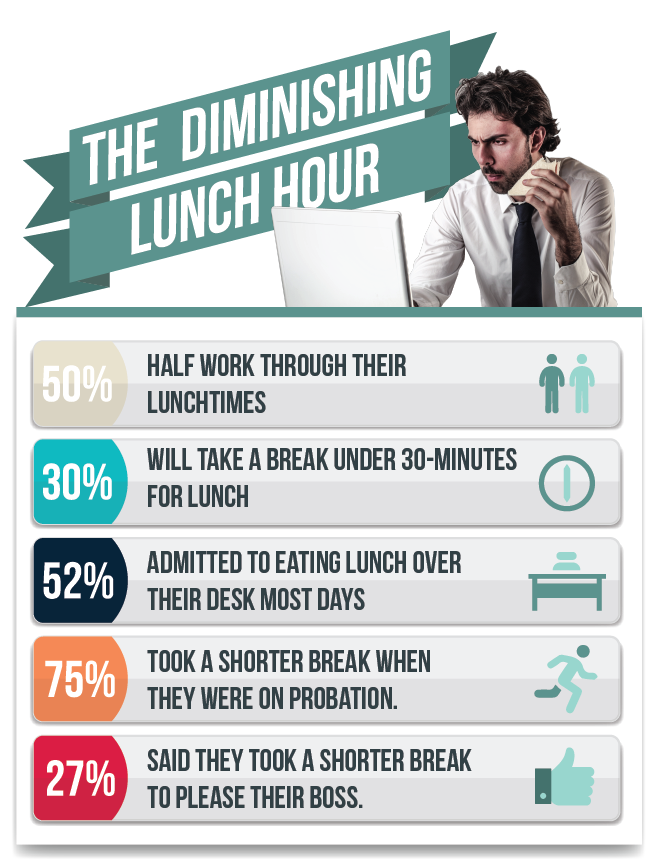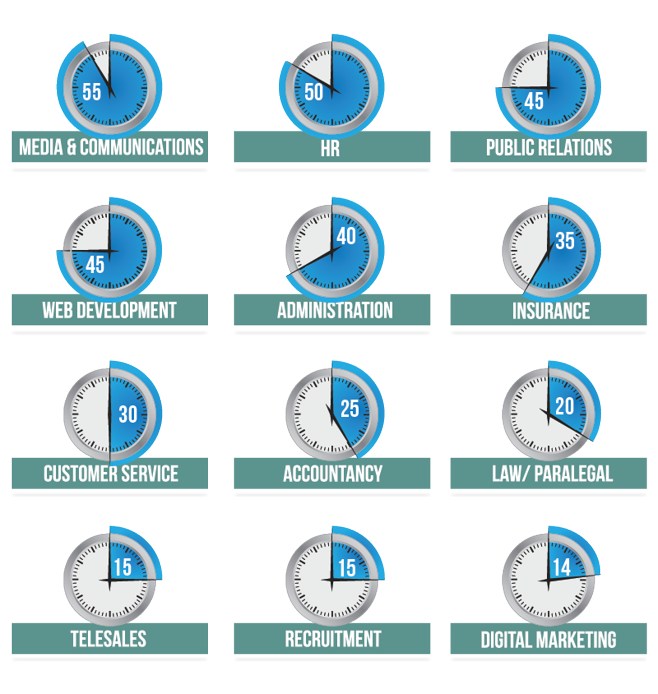50% of British employees are working through their lunches.
Jan 10 2017
Darren Best
Research has found that the traditional hour long lunch is slowly dissipating, with only 1 in 5 taking a traditional lunch break, half work through their lunchtimes and the rest take breaks under 30 minutes, as found by Right Management.
The law allows for a 1 hour interrupted 20-minute rest break after working 6 hours+, but those who are under 18 are entitled to 30 minutes if working above 4.5 hours. Some work contracts may even allow for additional breaks alongside lunch, like tea breaks.
Not only are Brits working through lunch, it’s also been found that UK workers are working more overtime: spending an average of 5 extra hours at the office per WEEK!

Share this Image On Your Site
Why you should take a break?
Many workers forget the importance of taking a lunch break. Working consistently for long periods isn’t good for your physical and mental wellbeing. Even a short 15-minute break away from the computer screen is a proven way to improve concentration levels for the rest of the day, when back at your desk.
A short break allows the brain to recuperate. A change of scenery also helps, as does some light-moderate exercise, which increases heart rate, and improves blood flow and circulation, included blood being carried to the brain.
Which office workers take the shortest breaks?
We at Savoy Stewart decided to figure out which workers are taking their full break, or closer to it, and which professions scrimp on their lunch break.
They found that digital marketers take the shortest breaks, taking a meagre 14-minute break away from the desk. Those at the other end are media & communications professionals who take almost their whole hour at 55 minutes.

Share this Image On Your Site
We spoke to individuals working in different sectors on why they had cut short their lunch breaks.
“My role is commission-based, so the more I sell in a day, the more pay I get… I feel like every minute I’m on my break, that’s valuable time I could be earning extra” - Recruiter from London.
“I haven’t passed my probation yet, and want to make the best impression to by boss and manager.” - Marketing executive, Bristol.
“An hour is too long. There is so much to be done, I really need that extra hour” - Web developer, Norwich.
What do CEO’s really think?
Due to the 27% that said they took a shorter break to please their boss, we decided to speak to business CEO's to discover how they really feel about workers not taking lunch breaks.
“Ultimately, it is their decision whether to take a break, everyone is different. But I would never see it as unfavourable. For me, I have to take a break to clear my mind!" - CEO of a recruitment company.
"I openly encourage my employees to take a break, to move from their desk and have a walk at lunch time, as it impacts so positively on productivity. I am considering taking employees to a monthly gym session just to get them on their feet!” - CEO of a Digital Marketing company.
Flexi-time
73% of managers are largely supportive of flexitime, and it was now standard practise at around 50% of companies (Institute of Leadership Management).
Interestingly, as many men are working flexitime as women now, whereas in the past flexitime was reserved for those who had childcare requirements (predominantly women). In Northern Europe, companies are operating with family-friendly policies
Cezanne latest HR industry study found that one third would switch to a lower paid job if it meant they could work flexibly, and have days where they could work at home, demonstrating that the monthly pay check isn't the only driver of UK employees when choosing a role.
It has become clear that the traditional lunch hour is dissapearing, overtaken by a culture of working longer hours and skipping lunches. However, it is likely that within time, employers and employees will realise that this unwilling to take a break could be truly detrimental to business. Across Europe, greater flexibility at work is occurring, with an increase with men and women working remotely, working flexi-time hours and family-friendly policies. It is probable that more UK companies will continue taking on such policies.
